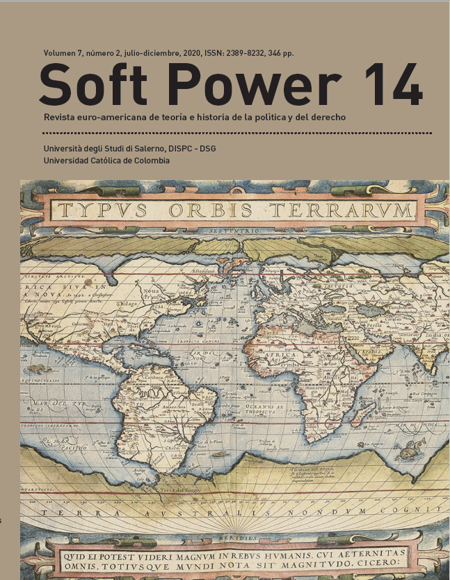
Esta obra está bajo una licencia internacional Creative Commons Atribución-NoComercial 4.0.
Al enviar los artículos para su evaluación, los autores aceptan que transfieren los derechos de publicación a Soft Power. Revista Soft Power para su publicación en cualquier medio. Con el fin de aumentar su visibilidad, los documentos se envían a bases de datos y sistemas de indización, así mismo pueden ser consultados en la página web de la Revista.Resumen
Este artículo y la entrevista relacionada tienen como objetivo explorar el legado intelectual del libro de Dipesh Chakrabarty Provincializing Europe: Postcolonial Though and Historical Difference (2000). El proceso de larga duración de la “provincialización” tanto de Europa como del mundo occidental se analiza a la luz de los desafíos mundiales más apremiantes de la actualidad. Se presta especial atención al proceso de integración europea, a los “orígenes coloniales” de la Comunidad Económica Europea y a la reconfiguración de las subjetividades laborales dentro de la sociedad contemporánea en Europa y más allá. En este sentido, nuestro objetivo es introducir una perspectiva poscolonial fructífera en un tema tan intrigante, es decir, la historia transnacional y la política de la integración europea. Este artículo se concibe como una larga introducción a una entrevista con el propio Chakrabarty, donde buscamos entender cómo conceptualiza las transformaciones de largo alcance que tanto Europa como todo el “globo” experimentaron en los últimos veinte años en el ámbito de las relaciones sociales, económicas, políticas y culturales transnacionales.
Palabras clave

Citas
Abels, G., & Mushaben, J.M. (Eds.). (2020). Gendering the European Union: New
Approaches to old Democratic Deficits. Basingstoke-New York: Palgrave Macmillan.
Arrighi, G. (1994). The long XX century: Money, Power and the Origins of Our Time.
London: Verso.
Balibar, É. (2020). Absolute Capitalism. In W. Callison, Z. Manfredi (Eds.), Mutant Neoliberalism.
Market Rule and Political Rupture. New York: Fordham University Press,
pp. 269-290.
Bellamy Foster, J., Clark, B. & and York, R. (2011), The Ecological Rift: Capitalism’s War
on the Earth (2011), New York: Monthly Review Press.
Brenner, N. (2004). New State Space. Oxford: Oxford University Press.
Brenner, N. (Ed.). (2014). Implosions/Explosions: Towards a Study of Planetary Urbanization.
Berlin: Jovis.
Castelles, M. (1996). The information Age: Economy, Society and Culture. Oxford: Wiley-
Blackwell.
Castelles, M. (1999). Grossroting the space of flows. Urban Geography, 20(4), 294-302.
Chakrabarty, D. (2000). Provincializing Europe: Postcolonial Thought and Historical Difference.
Princeton: Princeton University Press.
Cowen, D. (2014). The deadly life of logistics. Minneapolis: University of Minnesota
Press.
Farinelli, F. (2003). Geografia. Un’introduzione ai modelli del mondo. Torino: Einaudi.
Farinelli, F. (2008) “Il mondo non è più fatto a scale”. Camera di commercio Milano
Monza Brianza Lodi. Retrieved from: https://www.milomb.camcom.it/c/document_
library/get_file?uuid=fdb9fb71-de3c-4048-a2f8-b99e7391ba4a&groupId=10157
Frapporti, M., & Ventresca, R. (2020). L’Europa tra il “globale” e il “planetario”. A
vent’anni da Provincializing Europe. Zapruder. Rivista di storia della conflittualità
sociale, 51, 151-162 (translated in italian by Margherita Di Cicco).
Farinelli, F. (2009). La crisi della ragione cartografica. Torino: Einaudi.
Garavini, G. (2012). After the Empires: European Integration, Decolonization, and the
Challenge from the Global South 1957-1986. Oxford: Oxford University Press.
Gilbert, M. (2015). Cold War Europe: The Politics of a Contested Continent. London:
Rowman & Littlefield.
Grappi, G. (2016). Logistica. Roma: Ediesse.
Hansen, P., & Jonsson, S. (2011). Bringing Africa as a ‘Dowry to Europe’. European Integration
and the Eurafrican Project, 1920-1960. Interventions: International Journal
of Postcolonial Studies, 13(3), pp. 445-463.
Into the Black Box, & Matteucci, C. (Eds.). (2019). Logistical territories. lo Squaderno,
(51).
Maier, C.S. (2014). Leviathan 2.0: Inventing Modern Statehood. Cambridge, MA:
Harvard University Press.
Mezzadra, S. (2011). How Many Histories of Labour? Postcolonial studies, 14(2), 151-
Mezzadra, S., & Neilson, B. (2013a). Extraction, logistics, finance. Global crisis and the
politics of operations. Radical Philosophy, 178, 8-18.
Mezzadra, S., & Neilson, B. (2013b). Border as Method. Or, the multiplication of labour.
Dhuram: Duke University Press.
Mezzadra, S., & Neilson, B. (Eds.). (2015). Extraction, Logistics and Finance. The South
Atlantic Quarterly, 114(1).
Mezzadra, S., & Neilson, B. (2019). The Politics of operation: Excavating contemporary
capitalism. Dhuram: Duke University Press.
Mirowski, P., & Plehwe, D. (Eds.). (2009). The Road from Mont Pèlerin: The Making of
the Neoliberal Thought Collective. Cambridge, MA: Harvard University Press.
Neilson, B. (2012). Five Theses on Understanding Logistics as Power. Distinktion: Scandinavian
Journal of Social Theory, 13(3), 323-340.
Pieranni, S. (2020). Red Mirror. Il nostro future si scrive in Cina. Roma-Bari: Laterza.
Polanyi, K. (1944). The Great Transformation. New York, Farrar ¬ Rinehart.
Rajian, R. (2019). The Third Pillar How Markets and the State are Leaving Communities
Behind. New York: HarperCollins Publisher.
Schulz-Forberg, H., & Stråt, B. (2010). The Political History of European Integration: The
Hypocrisy of Democracy-Through-Market. London: Routledge.
Seth, S. (2012). After Europe – An introduction. Postcolonial studies, 14(2), 129-133.
Slobodian, Q. (2018). Globalists: the End of Empire and the Birth of Neoliberalism. Cambridge,
MA: Harvard University Press.
Tsing, A. (2012). On Nonscalability: The Living World Is Not Amenable to Precision-
Nested Scales. Common Knowledge, 18(3), 505-524.
Varsori, A., & Kaiser, W. (Eds.). (2010). European Union History: Themes and Debates.
Basingstoke-New York: Palgrave Macmillan.
Warlouzet, L. (2018). Governing Europe in a Globalizing World: Neoliberalism and its
Alternatives Following the 1973 Oil Crisis. London: Routledge.
Westad, O.A. (2017). Cold War: A World History. London: Allen Lane.










